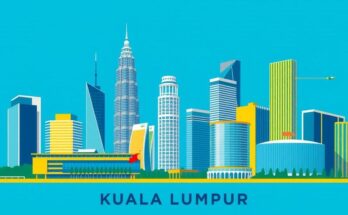Despite rising antisemitism, Iran’s Jewish community displays cultural pride and identity. Experts emphasize the distinction between Judaism and Zionism is essential for their acceptance in Iran. They possess legal protections that enable them to preserve their way of life, but economic struggles pose challenges. The community’s history showcases resilience against various hardships, and recent events spark curiosity about their continued presence in Iran.
In Iran, despite the rise of antisemitism and decreasing tolerance, the Jewish community continues to express profound cultural pride and a strong national identity. David Nissan, an expert on Iran and former Israeli intelligence officer, emphasized that Iranian Jews view their national identity as inherently tied to Iran rather than any foreign nation, including Israel. This sentiment is particularly significant in the face of challenges over the past 16 months.
Nissan elaborated on the state of Iran’s Jewish community, which has experienced considerable emigration since the 1979 Islamic Revolution. Nevertheless, essential aspects of Jewish life remain intact, including 30 active synagogues, Jewish schools, kosher butcheries, and a matzah factory. He noted that Iranian Jews do not suffer from persecution and their rights are legally protected, allowing them to observe their traditions freely.
However, Nissan identified the primary challenge for Iranian Jews as the need to distinguish Judaism from Zionism. He mentioned that to maintain their status as loyal citizens, the community must publicly demonstrate this separation, especially given the Iranian government’s view of Zionism as a threat. Additionally, the difficult economic climate in Iran exacerbates the community’s struggles, as many members belong to lower socioeconomic classes.
Historically, the Iranian Jewish community endured severe hardships, particularly after the Muslim conquest and during the Shi’ite consolidation of power in the 16th century, leading to pogroms and discrimination. In contrast, during the reign of Mohammad Reza Pahlavi, Iranian Jews enjoyed a golden age of integration into society. However, following the Islamic Revolution, the population drastically diminished from about 100,000 to only approximately 9,000 today.
Despite facing difficulties, many Iranian Jews currently have no desire to emigrate. Nissan remarked that those wishing to leave can do so, but low acceptance rates of incentives to immigrate to Israel suggest that most do not view it as an appealing alternative. Cultural ties, economic factors, and concerns for safety contribute to their decision to remain in Iran.
A series of discussions titled “Perspectives on Iranian Jews” has recently begun at the ANU – Museum of the Jewish People in Tel Aviv, highlighting this unique Jewish community. Rivka Aderet, head of content at ANU, stated that the attention on Iran has grown globally due to the country’s isolation and the contrast between Iranian and Western lifestyles.
Aderet pointed out the longstanding history of Iran’s Jewish community, exemplified by narratives such as the Book of Esther. The community’s resilience, amid ongoing challenges, invites curiosity about why they choose to stay in Iran instead of immigrating to other countries like Israel or the United States.
Oded Ravivi, CEO of ANU, observed that the experience of Iran’s Jewish community is not only relevant but resonates deeply within the broader context of Jewish history. He stressed the importance of fostering a sense of belonging among Diaspora Jews while ensuring their safety should they choose to immigrate to Israel. This mission remains vital in today’s context.
The survival of Iran’s Jewish community amid rising antisemitism highlights their cultural pride and commitment to their national identity. Despite historical and current challenges, including economic hardship, they continue to maintain their religious practices. The upcoming discussions at the ANU Museum offer an important opportunity to explore this unique community’s complexities and reasons for their persistence in Iran.
Original Source: www.heritagefl.com




